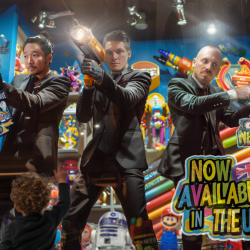In an increasingly competitive landscape, brands must take risks to stand out and draw consumer flavour. However, that’s not to say it isn’t intimidating. A poll of 300 marketers conducted by CIM found that many fear their brand being ostracised for some sort of social faux pas, with 41% fearing they will become the next victim of global ‘cancel culture’. Yet, this behaviour shouldn’t mean marketers should resort to ‘safe’ ideas simply because they are afraid.
A little risk isn’t bad
Risk often leads to higher rewards if the payoff is successful. It helps brands stand out, show vulnerability and, as a result, opens up new opportunities. As the proverb goes, fortune favours the brave. And while it can feel nerve-racking at first, few things are truly insurmountable. Even political figures who fall from the highest office usually stage a comeback.
However, while we all view risk differently, there is a line drawn in the sand. Taking a risk does not equal being offensive, nor is being brave about making reckless decisions. Being calculated with an acceptable measure of risk is key. As long as you’re not making an irresponsible gamble with people’s values — go big, think bold and stand out.
What is an acceptable measure of risk?
Being brave and bold is different from trying to be purposefully provocative. Risk can have a big reward. However, doing something just to prove a point is less likely to pay off. It has the potential for just as negative, and large, consequences if it backfires.
Take Brewdog for example; its recent ‘Anti-Sponsor’ campaign protesting against Qatar hosting the World Cup garnered significant backlash. Many consumers took to social media to point out the brewer’s hypocrisy, given it still planned — and is — showing matches at its venues and continues to sell its products in Qatar. Ultimately, the anti-sponsor campaign has given Brewdog the platform to create punchy and noticeable work. Still, from the start, it felt disingenuous and inauthentic because it didn’t align with the brand’s actions. It felt like an attempt to live up to its ‘punk’ values, with perhaps only a skin-deep commitment to the cause.
Being authentic is crucial for toeing the line
It’s worth noting that Brewdog has a long history of provocative posturing and reputational slip-ups — which has likely spurred more debate and criticism around this particular ad. But it would be a shame if such campaigns were to stop other brands from taking bold stances on significant issues (especially considering 71% of consumers say it’s important for brands to raise awareness and take a stand on social issues). Audiences evolve and issues change — there’ll always be a brand that chooses to take the first stand and discouraging that would slow societal progress on a wide range of issues — even if the approach is less than perfect.
We risk fading into the background by sitting on the fence and never daring to ‘take the leap’. People talk about Marmite. “You either love it, or you hate it”, and this should be celebrated. Not everyone is our target audience. By raising and sharing an opinion, we find like-minded others who can join our tribe. Patagonia is a brilliant example of this when it famously made Earth its ‘sole shareholder’ in September (putting all profits into sustainable projects). Of course, this is truly the pinnacle of purpose — rarely can a brand give away its company to progress what it stands for. However, it was highly praised not just for its humanitarian efforts, but because successful brands show up in the same shape, regularly and recognisably. This action is consistent with the company’s ethos, which brought it into the limelight — and profit — for many years before it ever ‘belonged’ to the Earth.
What’s the best way to begin?
Patagonia and Brewdog show us how important it is to know your brand like the back of your hand. If you know what your brand stands for, its core values and beliefs, it’s much more difficult to be inauthentic in communications. Once this is established, begin thinking about how far you’re willing to go to live out the ‘purpose’ you exist for. This way, you’ll constantly be pushing yourself that little step further while measuring the ‘riskiness’ of your actions.
Long-term, it is likely to pay off.
Featured image: Malik Skydsgaard / Unsplash


























